Latin America
Related: About this forumFormer President Of El Salvador Receives 14-Year Sentence For Gang Talks
Rohan Parakkad / May 30 2023, 04:30 AM EST
Former President Mauricio Funes was given a 14-year jail term by an El Salvadorian court for engaging in gang-related negotiations during his administration.
In a trial that commenced in April while Funes resided in Nicaragua, a court in El Salvador has now issued a 14-year prison sentence. This verdict comes after the country modified its laws last year to permit trials in absentia.
During the trial, prosecutors leveled charges of illicit association and dereliction of duties against Funes, who held the presidency in El Salvador from 2009 to 2014. These charges were linked to a gang truce established in 2012.
Funes consistently refuted the allegations of engaging in negotiations with the gangs or granting them any special treatment, emphasizing that the truce was facilitated by the Catholic Church rather than the government.
More:
https://www.latintimes.com/former-president-el-salvador-receives-14-year-sentence-gang-talks-544472
Judi Lynn
(164,067 posts)The Funes Administration in El Salvador: A Review of the First Year
A conference was convened to assess the Funes administration's first year in office, bringing together senior Salvadoran government officials and other experts.
DATE & TIME
Friday
Jun. 25, 2010
9:00am – 1:30pm ET
The March 2009 presidential election of Mauricio Funes in El Salvador represented a turning point in the country's progress towards democracy. Following a bloody twelve-year civil war and almost two decades in the political opposition, the former guerrilla group-turned political party, the Farabundo Martí National Liberation Front (FMLN), won the country's presidential election. The victory of Funes over the governing ARENA party represented the first time that the FMLN had reached outside its ranks for a more centrist candidate with broad national appeal. To assess the Funes administration's first year in office, the Latin American Program convened a June 25, 2010, conference bringing together senior Salvadoran government officials, scholars, journalists, and representatives of international development institutions. Panelists focused on the ability of President Funes to unite diverse politi-cal factions and actors in order to address the nation's foremost problems.
Director of the Latin American Program Cynthia Arnson summarized the country's most significant challenges. The global economic crisis has taken a toll on the small, liberalized economy; exports to the United States have dropped and remittances from Salvadorans abroad have also plummeted. Crime and insecurity are rampant: a 2009 report by the United Nations Development Program designated Central America, particularly the "northern tier" composed of El Salvador, Honduras, and Guatemala, as having the highest levels of non-political violence in the world. Drug trafficking organizations and other forms of organized crime are on the rise, establishing relationships with other criminal groups, including transnational gangs. As if this were not enough, natural disasters continue to wreak havoc on the small country.
The keynote speaker, Salvadoran Minister of Foreign Relations Hugo Martínez, highlighted the Funes administration's political achievements in its first year. He emphasized President Funes' commitment to national unity and the steady, calculated approach to the economic, social, and natural disasters facing the country. The administration established an Economic and Social Council to review national economic and social policies and seek consensus on future directions. There have also been advances in educational and income-generating programs aimed at vulnerable youth. Police reform has also shown successes, with 237 corrupt officers fired and another 1,000 being investigated for participation in cover-ups, money laundering, and organized crime.
Foreign Minister Hugo Martínez also laid out how the Funes administration's foreign policy has shifted, from a previous emphasis on ideological ties to the creation of transnational relationships which foment and share ideals of peace, democracy, and state autonomy. El Salvador has worked proactively to strengthen relations with Brazil and the United States as well as with global emerging markets, the European Union, and other Central and South American nations. Martínez highlighted President Funes' human rights initiatives, including the provision of reparations to individuals and families victimized during the twelve-year conflict. Martínez argued that the new directions in El Salvador's domestic and foreign policy have brought the country new respect and greater international presence.
Congressman Jim McGovern (D-MA), who has focused on El Salvador and U.S. policy since the 1980s, Rep. called the election of Mauricio Funes a "watershed moment" for Salvadoran democracy. He noted that since the signing of the 1992 peace accords, political competition has flourished; the electoral process has matured; new political coalitions and political parties have emerged; and civil society groups are increasingly engaging in public discourse. Nonetheless, impunity prevails under a weak judicial system that cannot hold elites, government officials, or members of the military or police accountable. Widespread benefits from foreign trade and investment have yet to materialize for the country's poor, and the devastating impacts of natural disasters, including recent Tropical Storms Ida and Agatha, continue to impede the nation's progress. McGovern underscored the increase in violent crime since the end of the war, and the intransigence of sectors that continue to benefit from crime, corruption, and impunity. He expressed hope, however, that the peaceful future envisioned in the peace accords would one day be attainable and called El Salvador, along with Costa Rica, the "most stable, functioning democracy in Central America."
More:
https://www.wilsoncenter.org/event/the-funes-administration-el-salvador-review-the-first-year
Judi Lynn
(164,067 posts)The American right is falling in love with El Salvador’s president, Nayib Bukele, over his crime crackdown. But he’s also tearing down Salvadoran democracy.
By Zack Beauchamp@zackbeauchampzack@vox.com Apr 8, 2023, 8:00am EDT
Zack Beauchamp is a senior correspondent at Vox, where he covers ideology and challenges to democracy, both at home and abroad. Before coming to Vox in 2014, he edited TP Ideas, a section of Think Progress devoted to the ideas shaping our political world.
When Donald Trump was arrested this week, most world leaders stayed silent. But Nayib Bukele, the president of El Salvador, tweeted about it immediately.
“[J]ust imagine if this happened in any other country, where a government arrested the main opposition candidate,” Bukele wrote. “The United States ability to use ‘democracy’ as foreign policy is gone.”
Such a development would be convenient for Bukele, who has emerged as one of the most prominent — and flamboyant — elected autocrats on the global stage. In the span of roughly a year, the 41-year-old leader has declared a state of emergency, suspended civil rights protections, detained tens of thousands of citizens indefinitely without charge, built a new mega-prison made up of cells that cram 100 people in each, and packed the country’s highest court with his picks — who then promptly changed electoral rules to allow him to run again in 2024.
Salvadoran human rights advocates are sounding the alarm about democracy’s death, and the Biden administration has sanctioned key members of his government.
The response on the American right has been strikingly different. The authoritarian rhetoric, brash right-wing policies, and loud social media presence have captured the imagination of a small but influential group of American conservatives. In the past year, leading figures in MAGA world — including Tucker Carlson, Michael Flynn, and Roger Stone — have praised Bukele, and even instructed Americans to learn from his example.
More:
https://www.vox.com/2023/4/8/23653324/nayib-bukele-trump-american-right-crime
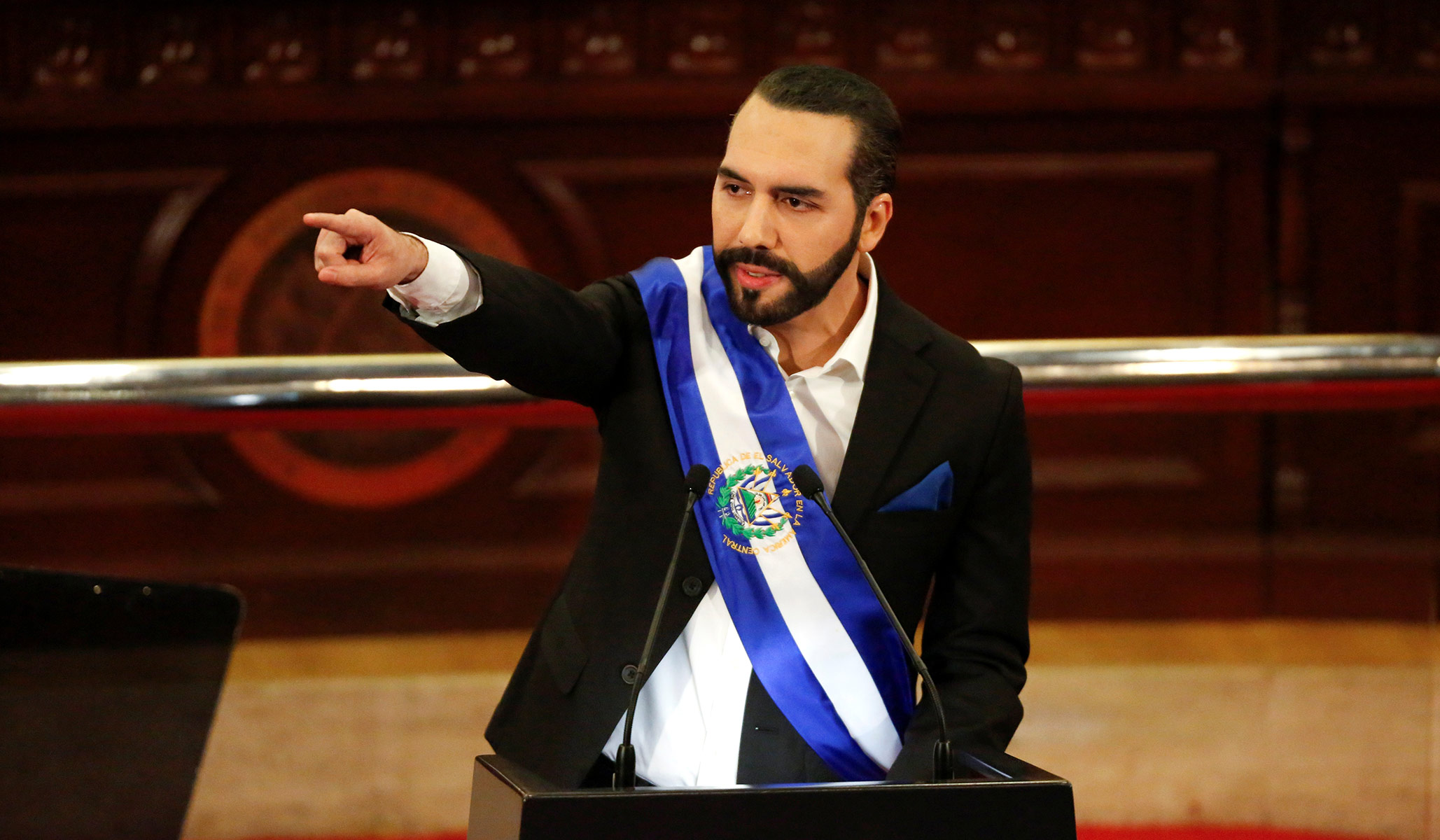
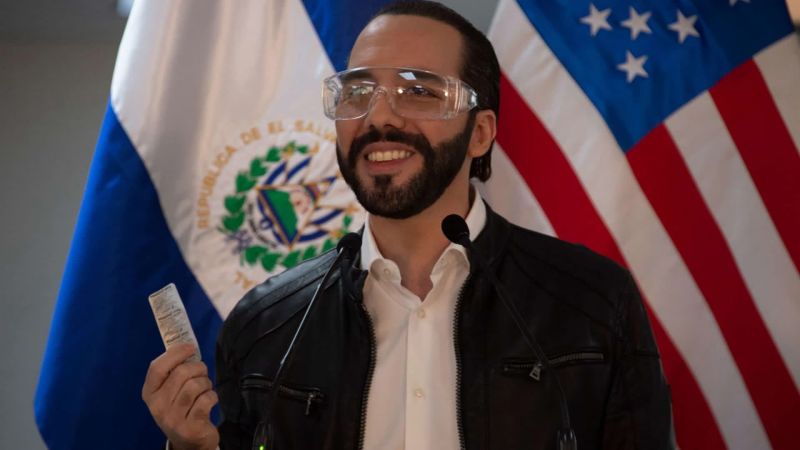

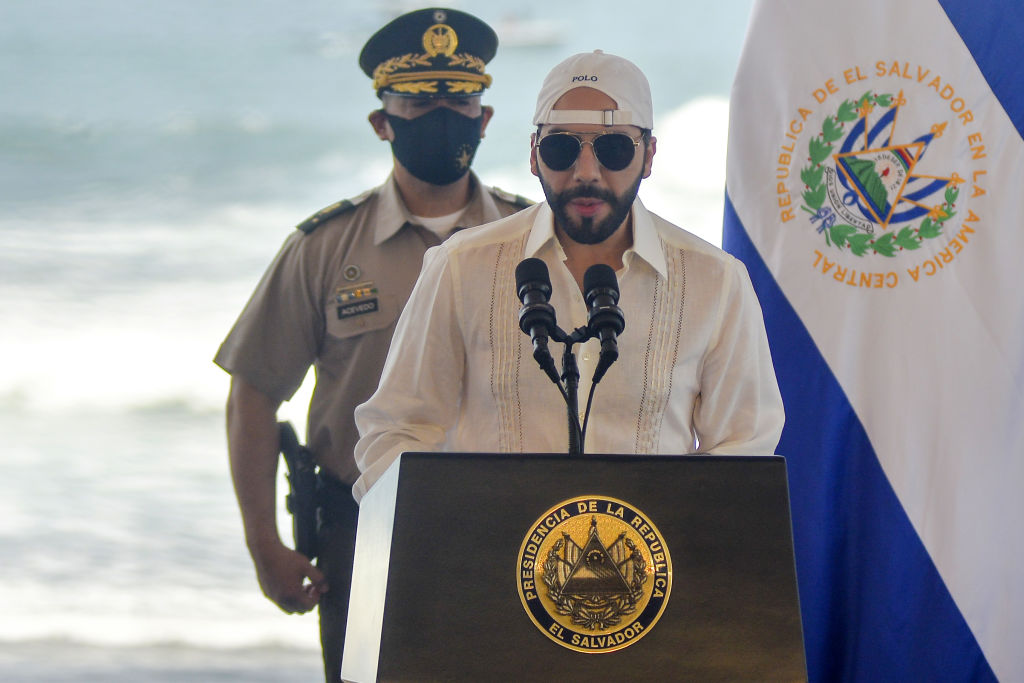
Judi Lynn
(164,067 posts)March 13, 2023
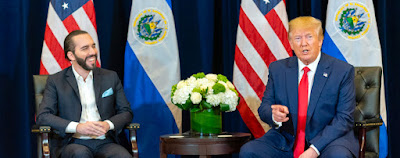
President Nayib Bukele of El Salvador has become the Latin American leader most lauded by the far right in the United States. The millennial president, who once labelled Donald Trump “nice and cool” after meeting with Trump on the sidelines of a UN General Assembly meeting, is now being held up by the far right as a model for what strong national leader should be.
Among the conservatives, one group of Bukele fans are libertarian in their leanings – these are the supporters who enthusiastically promote Bitcoin. They support Bitcoin for providing a currency system which is free of government control and not dependent on the actions of multinational financial institutions. When Bukele tweets “We will stand for freedom… bitcoin is FU money” these libertarian Bitcoiners stand up and cheer.
More recently, a different swarm of conservative pundits has come out in praise of Bukele after his recent videos of the transfer of the first prisoners into the new mega-prison outside of San Vicente. The images of heavily tattooed, shackled, half-naked prisoners in positions of submission made perfect video for tough on crime messaging by right wing commentators.
Two members of the New York Young Republican Club wrote an opinion piece in Newsweek proclaiming Bukele has “a blueprint for restoring law and order to its rightful place in governance.” An article in The American Conservative declared “there is still inspiration to take from Bukele’s success.” In a speech on March 4 at the Conservative Political Action Conference (CPAC) meeting, Michael Knowles of the Daily Wire said to applause:
More:
https://www.elsalvadorperspectives.com/2023/03/the-far-right-in-us-falls-for-bukele.html
Judi Lynn
(164,067 posts)While the Biden administration hopes to eventually engage Bukele, it has serious concerns about his respect for the rule of law and democracy, according to people with knowledge of the decision.
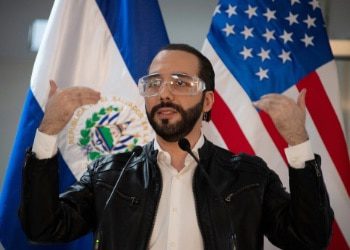
El Salvador's president Nayib Bukele during a press conference in San Salvador on May 26, 2020.Yuri Cortez / AFP via Getty Images file
Feb. 9, 2021, 1:33 PM CST / Source: Associated Press
By The Associated Press
The Biden administration turned down a meeting request with El Salvador’s president on an unannounced trip to Washington last week, as criticism of the Central American leader mounts among Democrats, three people with knowledge of the decision said Monday.
The trip by Nayib Bukele, which has not been previously reported, came after a senior White House official warned in an interview with a Salvadoran news outlet highly critical of Bukele that the Biden administration expected to have “differences” with him.
Bukele was quick to embrace former President Donald Trump’s hardline immigration policies restricting asylum requests, which won him a great deal of U.S. support for his tough governing style in El Salvador, where he is popular. But like other world leaders befriended by Trump, he faces an uphill climb pivoting to the Biden administration, which is seeking to undo those policies and has signaled its relationship with El Salvador is under review.
The president’s surprise trip amid a pandemic posed a dilemma for U.S. policy makers. They were given little advance notice and are mostly avoiding in-person meetings due to the coronavirus and because many senior positions remain vacant, said the the three people, all of whom are in Washington and insisted on speaking anonymously in return for discussing internal decision-making.
In rejecting Bukele’s request, the Biden officials wanted to ensure Bukele didn’t try to tout any meeting as a show of support before legislative elections later this month where he's seeking to expand his power base, the people said. However, they did make an exception for Ecuadorian President Lenín Moreno, who met in Washington with senior Biden officials 11 days before the Andean nation’s presidential election.
More:
https://www.nbcnews.com/news/latino/biden-officials-turn-down-unannounced-visit-el-salvador-pres-nayib-n1257160

Judi Lynn
(164,067 posts)May 28, 2009
El Salvador's president-elect, Mauricio Funes, testified emotionally today in the trial for the murder of his son Alejandro in October 2007. The
BBC reports:
The president-elect of El Salvador has made an emotional statement at a trial for his son's murder in Paris.
"I am a man who is not seeking vengeance... only the truth," said Mauricio Funes. He wept in court.
Alejandro Funes, 27, a photography student in France, died in October 2007 from stab wounds on a pedestrian bridge near the Louvre Museum.
Mohamed Amor, the main suspect, has asked the family for forgiveness. The motive of the attack is unclear....
President-elect Funes's brother was shot dead at the beginning of El Salvador's civil war in 1980 and safety had been a factor in Alejandro leaving the country, plagued by gang violence, to study in France.
"We thought he would be safer here.. I would never have imagined that he would be beaten to death here," said Mr Funes, unable to stop himself from crying as he spoke.
The left-wing leader, who takes office in June following his electoral victory in March, paid tribute to his son.
"We shared the same ideals, the same life projects and the desire to transform El Salvador, to convert it into a just society that would put an end to violence," Mr Funes said.
Funes will be inaugurated as El Salvador's first left-wing president next Monday, June 1.
https://www.elsalvadorperspectives.com/2009/05/funes-testifies-in-trial-of-sons.html
Had not seen this anywhere in US media. I would have noticed if it had been published in corporate news here.
Judi Lynn
(164,067 posts)Letter from El Salvador September 12, 2022 Issue
The budding strongman has ridden Bitcoin schemes and a repressive crackdown on gangs to become Latin America’s most popular leader.
By Jonathan Blitzer
September 5, 2022
El Penalito, the little jail, is a squat concrete structure on a busy commercial street in San Salvador, the capital of El Salvador. On the morning of April 7th, a Thursday, fifty women were lined up along its front wall, wearing surgical masks and holding umbrellas against the sun. They’d been gathering there all week. It was nine-thirty, and about ninety degrees. Most of the women had been waiting since eight to reach a small window where a police official shared information on the whereabouts of their sons and husbands.
Toward the back of the line, wearing a long denim skirt and a red T-shirt, was a middle-aged woman with dark, lined skin and deep-set eyes. Her name was Yanira, and her son, she said, was a twenty-year-old with autism. He’d been arrested three days earlier, at home, where the two had been working throughout the pandemic, cleaning and reselling discarded plastic sleeves that hold bottles of hand sanitizer. Yanira rarely leaves him alone, but she had to run an errand. When she returned, thirty minutes later, the police had taken him away. “Sometimes he’ll wander into the street without his shoes,” she told me. “All the neighbors know him. But someone who doesn’t might think he’s a criminal, or crazy.”
A week before, members of El Salvador’s largest gang, MS-13, had murdered eighty-seven people in three days. The country has long been ravaged by gang violence, but these killings were unusual in their ruthlessness. People with no ties to crime were targeted: a fruit seller, a surf instructor, a homemaker, a cobbler. The gangsters went after everybody, but their message was directed at one person—the country’s President, Nayib Bukele, who has promised to radically reduce crime and to change El Salvador’s image abroad. Gang members left a corpse on the road leading to Surf City, a stretch of beachfront real estate on the Pacific Coast which Bukele had refurbished and renamed to attract international tourists.
In recent decades, every Salvadoran President has contended with the gangs. One administration sent soldiers to poor neighborhoods and filled the country’s prisons, under a policy it called mano dura, or “strong hand”; another reprised it as super mano dura. When Bukele was the mayor of San Salvador, he called these responses “immoral” and “impractical.” But now he declared war. Just after midnight on the second day of the homicide spike, the National Assembly, which Bukele’s party controls, instituted a “state of exception,” under which authorities could arrest anyone they considered suspicious. Detainees were not entitled to a legal defense. The right to gather in groups larger than two was suspended, and all minors would be tried as adults. On his Twitter account, Bukele, who is forty-one years old and has an approval rating of more than eighty per cent, shared a running tally of the arrests that followed, along with scabrous commentary, posting photographs of tattooed men in handcuffs and underwear (“little angels”), some of whom appeared to have been roughed up (“He must have been eating fries with ketchup”). Critics of the new policy—whether common citizens, journalists, or foreign governments—supported “the terrorists,” he wrote.
More:
https://www.newyorker.com/magazine/2022/09/12/the-rise-of-nayib-bukele-el-salvadors-authoritarian-president
Judi Lynn
(164,067 posts)Greg Weeks | September 23, 2021
Global Americans Contributor

Photo: AFP via Getty Images
Salvadoran President Nayib Bukele is now facing protests over multiple corruption scandals, a packed court giving him the right to re-election, and a controversial bitcoin rollout. Bukele has responded to critics with derision, even changing his Twitter bio to “Dictator of El Salvador” on Sunday night. Newsweek wondered whether the president’s account had been hacked. Bukele’s profile was hacked, but not in the traditional sense. Instead, his Twitter account, and the state of democracy in El Salvador, has been hacked by a strain of twenty-first century authoritarianism.
Since before taking office, Nayib Bukele has carefully crafted an image of youth and hipness, with a hint of irony, just a regular guy with a backwards cap on his iPhone. Referring to himself as a dictator will leave his supporters nodding and laughing, and his opponents in a rage. He leaves just enough doubt to say, “I was only joking.” The latest change to his bio isn’t Bukele’s first such gesture. Earlier this year he changed his Twitter profile picture to an image of the actor Sacha Baron Cohen from his movie “The Dictator.”
But it’s not a joke. One aspect of twenty-first century right-wing authoritarianism is appropriating your opponents’ insults in order to say what had previously been unspeakable. An infamous example is Hillary Clinton referring to a “basket of deplorables” in reference to supporters of Donald Trump. “Deplorable” specifically meant those with “racist, sexist, homophobic, xenophobic, Islamophobic, you name it” views. This was as intense a criticism as she could muster, at least publicly.
Before long, the ubiquitous red MAGA hats were matched by t-shirts proclaiming the wearer to be “proud to be a Trump deplorable.” They weren’t bothered in the slightest about being labeled as largely misanthropic. It was a badge of honor to be something that Hillary Clinton hated.
We see a similar context in Brazil. President Jair Bolsonaro is criticized for waxing nostalgic about Brazil’s Cold War military dictatorship, so his supporters attend protests in pro-dictatorship t-shirts, or with Bolsonaro in army fatigues. Dictatorship becomes stylish.
Since the end of the Cold War, public celebration of dictatorship and racism has tended to be at the fringes of society, but now it is mainstream presidential rhetoric. Followers who previously felt they had to keep their views to themselves can openly declare what they believe, no matter how violent. Their leaders encourage it.
When he isn’t tweeting furiously about bitcoin, Bukele tweets denunciations of journalists, even posting specific pictures of those he says are attacking him unfairly. It does not take much effort to understand the chilling effect such messages have. Journalists, especially women, report being directly threatened on social media and harassed. Further, in a high-profile move, Bukele expelled Mexican journalist Daniel Lizárraga of El Faro, an important Salvadoran digital newspaper.
Meanwhile, attacks on the opposition FMLN party led its members to hold Bukele responsible and call him a murderer. As the Salvadoran Human Rights Defenders Network put it, Bukele’s harassment creates a context of “extreme hostility,” which leads to “fear and self-censoring.”
More:
https://theglobalamericans.org/2021/09/its-no-joke-bukele/
Judi Lynn
(164,067 posts)Published 29 May 2023 (19 hours 17 minutes ago)
by Rahim Volkov

Former President Mauricio Funes, who currently lives in exile in Nicaragua, was tried in absentia due to a legal reform that allows it. May. 29, 2023. | Photo: Twitter/@jatirado
Former Salvadoran President Mauricio Funes (2009-2014) was sentenced on Monday by a criminal court in El Salvador to 14 years in prison for crimes committed during his administration, having facilitated a truce with gangs. The Attorney General's Office (FGR) also reported via Twitter that "David Munguía Payés, former Minister of Justice and Security, has received an 18-year prison sentence."
The 63-year-old former Salvadoran president who currently lives in exile in Nicaragua and with Nicaraguan citizenship was tried in absentia due to a legal reform that allows it.
Funes received 8 years for the charge of illicit groups and 6 years for breach of duties, said the Prosecutor's Office, while noting that the sentences and charges were the same for retired general Munguía Payés, who also received 4 years in prison for arbitrary acts.
Between 2012 and 2014, the Funes administration backed an armistice maintained by the Mara Salvatrucha (MS13) and Barrio 18 gangs, among others, with the aim of reducing the number of homicides.
More:
https://www.telesurenglish.net/news/14-Years-in-Prison-for-Former-Salvadoran-President-Funes-20230529-0018.html
Judi Lynn
(164,067 posts)Former Salvadorian President Sentenced to 14 Years for Overseeing Mara/Barrio 18 Gang Truce
By Socalj 5/30/2023 04:33:00 PM
“Socalj” for Borderland Beat:

In a message on Twitter, the former president argued it was “an unfair sentence without any evidence.” “The FGR did not present any proof that the benefits supposedly received by the gang members were authorized by the presidency. There is no doubt that the Specialized Investigating Court is obeying the right,” he added.
. . .
Bukele’s government has maintained a state of exception since March 27, 2022, as a response to gang violence. The measure was adopted after MS-13 and Barrio 18, the two largest gangs in the country, organized a massacre that left 87 dead in the streets in just one weekend. According to journalists’ investigations, the massacre was due to a rupture of the pact that Bukele had with the gangs since the beginning of his administration, which kept the violence low.
. . .
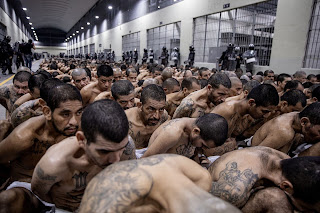
Mass Gang Incarceration Torture & Deaths
Cristosal, the main defender of human rights in El Salvador, released a report on Monday denouncing the hellish conditions in Bukele’s prisons, where dozens of inmates have been tortured and strangled. Since March 2022, when current President Bukele implemented emergency powers to deal with the country’s issue of gang violence, 153 of the prisoners have died in custody.
In its report, Cristosal documents 153 inmate deaths in state custody between March 2022 and March 2023. Notably, all of the deceased inmates were arrested during this same period. Of these, 29 died violently, and another 46 by "probable violent death" or suspected criminality. Unfortunately, the number could be higher, as some of the cases were reported after March 23 of this year and were not included in this count.
Among those 75 cases, the investigation points out as a “common pattern” the presence of lacerations, hematomas caused by beatings, wounds with sharp objects, and signs of choking or strangling on the cadavers. According to the report, death by mechanical asphyxiation is one of the “most frequent” causes of death described in medical-legal reports.
One of the clearest cases is that of a 30-year-old man whose dead body was given to his relatives with a protuberance on the neck. The medical documents reported that he died as a result of “mechanical asphyxiation by strangling.” The autopsy of another man, a 42-year-old who died in a police cell, determined the cause of death as “mechanical asphyxiation by choking.
More:
http://www.borderlandbeat.com/2023/05/former-salvadorian-president-sentenced.html
